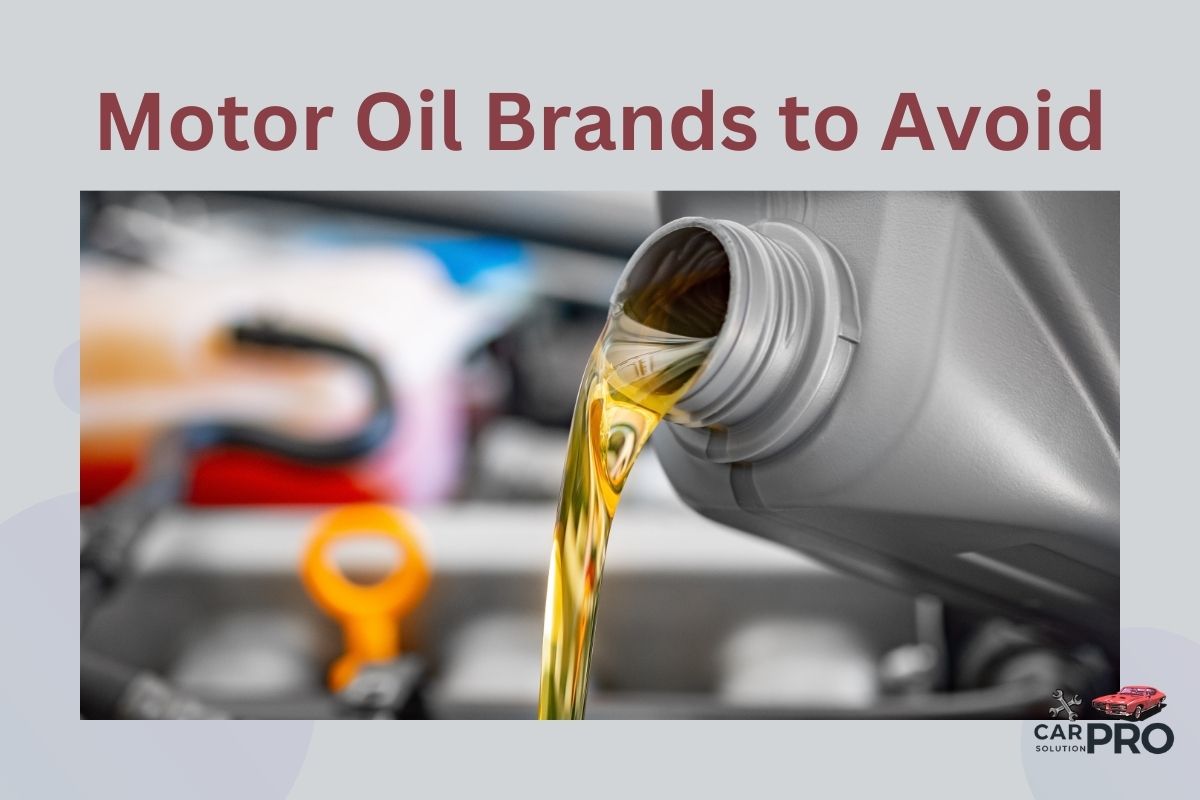Choosing the right motor oil is crucial for keeping your car running smoothly. Not all motor oils are created equal, and some can even harm your engine. Some motor oil brands use deceptive packaging, making it hard for consumers to make good choices.
It’s important to know which motor oil brands to avoid. Poor quality oils can lead to engine damage, reduced performance, and costly repairs. By learning about problematic brands, you can protect your car and save money in the long run.
Experts have identified several motor oil brands that don’t meet industry standards. These oils may not provide enough protection for modern engines or may contain harmful additives. Knowing which brands to steer clear of can help you make better decisions for your vehicle’s health.
Key Takeaways
- Low-quality motor oils can cause engine damage and reduced performance
- Some brands use misleading packaging to hide substandard products
- Choosing reputable motor oil brands helps protect your engine and save money
Understanding Motor Oil
Motor oil is crucial for keeping engines running smoothly. It protects against wear, reduces friction, and helps remove heat and contaminants.
Functions and Importance
Motor oil lubricates engine parts to reduce friction and wear. It forms a protective film between moving metal surfaces, preventing direct contact.
The oil also helps cool the engine by carrying heat away from hot areas. It cleans the engine by picking up dirt and debris, carrying it to the oil filter.
Motor oil neutralizes acids that form during combustion. This prevents corrosion of engine parts. It also helps seal the space between piston rings and cylinder walls.
Regular oil changes are key. Fresh oil works better to protect and clean the engine. Old, dirty oil can damage engine parts.
Types of Motor Oils
There are four main types of motor oils:
- Conventional – Made from refined crude oil
- Synthetic – Chemically engineered for better performance
- Synthetic blend – Mix of conventional and synthetic
- High-mileage – For vehicles with over 75,000 miles
Synthetic oils offer better protection and performance. They flow better in cold temps and resist breakdown at high temps. Synthetic oils also last longer between changes.
High-mileage oils contain additives to help older engines. These additives can reduce oil consumption and prevent leaks in aging seals.
API ratings indicate oil quality and performance. Higher ratings mean better protection. Always use the grade and type recommended for your vehicle.
Criteria for Quality Assessment
Quality motor oil meets specific standards and provides optimal engine protection. Key factors include viscosity, additives, and industry certifications.
Viscosity Ratings
Viscosity measures oil’s resistance to flow. It’s crucial for proper engine lubrication. The Society of Automotive Engineers (SAE) sets viscosity grades like 5W-30 or 10W-40.
The first number shows cold temperature performance. Lower numbers mean better cold starts. The “W” stands for winter.
The second number indicates high-temperature thickness. Higher numbers provide better protection at high temps.
Proper viscosity is vital. It ensures oil flows quickly to engine parts on cold starts and stays thick enough to protect at high temperatures.
Additive Packages
Additives enhance oil performance. They help clean, protect, and extend engine life.
Common additives include:
- Detergents: Clean engine parts
- Dispersants: Keep contaminants from settling
- Anti-wear agents: Reduce friction
- Antioxidants: Prevent oil breakdown
- Corrosion inhibitors: Protect metal surfaces
Quality oils use balanced additive packages that work together. This prevents sludge buildup and protects against wear.
Industry Standards and Certifications
Reputable motor oils meet or exceed industry standards. These certifications ensure quality and performance.
Key certifications include:
- API (American Petroleum Institute): Sets minimum performance standards
- ILSAC (International Lubricant Standardization and Approval Committee): Focuses on fuel economy
- ACEA (European Automobile Manufacturers Association): European standards
Oils meeting these standards undergo rigorous testing. They must pass tests for viscosity, oxidation resistance, and engine protection.
Look for certification symbols on oil containers. The API “donut” and ILSAC “starburst” are common quality indicators.
Brands with Substandard Reputations
Some motor oil brands have gained poor reputations due to quality issues and safety concerns. These problems range from recurring performance issues to recent product recalls.
Brands with Recurrent Issues
Several motor oil brands have faced ongoing criticism for their products. Liberty Motor Oil has been flagged for poor viscosity and low quality. Users have reported engine problems after using this brand.
Questron is another brand that has received negative feedback. Its oils often fail to meet industry standards for protection and performance.
Petrola has also been cited as a problematic brand. Many mechanics advise against using Petrola products due to inconsistent quality and potential engine damage.
Q10-40 is frequently mentioned among oils to avoid. It lacks proper certification and may not provide adequate engine protection.
Recent Recalls and Warnings
In recent years, some motor oil brands have faced recalls or warnings. Xpress Lube Pro was subject to a recall due to packaging issues that could lead to contamination.
Quaker State Q received warnings from consumer watchdog groups about misleading labeling. The product’s performance did not match its advertised claims.
Bullseye motor oil faced scrutiny for failing to meet minimum viscosity standards. This led to warnings from automotive experts about potential engine wear.
Mileage 365 was recently cited for inadequate additive packages. This deficiency could result in reduced engine protection and shorter oil change intervals.
Impact of Using Low-Quality Motor Oils
Using poor quality motor oils can harm your engine in multiple ways. These oils may not provide adequate protection, leading to increased wear and potential damage over time.
Engine Performance Complications
Low-quality motor oils can cause significant problems with engine performance. They may not effectively reduce friction between moving parts, resulting in increased heat and wear. This can lead to a drop in engine efficiency and power output.
Poor quality oils often break down faster under high temperatures. This leaves engine components exposed and vulnerable to damage. As a result, drivers may notice:
- Decreased fuel economy
- Rough idling or stalling
- Unusual engine noises
- Reduced acceleration
These issues can worsen over time if low-quality oil use continues.
Long-Term Engine Damage
Prolonged use of subpar motor oils can cause serious long-term damage to an engine. These oils may not properly clean or protect engine parts, allowing harmful deposits to build up.
Some potential long-term effects include:
- Premature wear of engine components
- Increased risk of engine seizure
- Clogged oil passages
- Damage to bearings and cylinder walls
In extreme cases, using very low-quality oils can lead to complete engine failure. This often results in costly repairs or the need for a full engine replacement.
Regular oil changes with high-quality motor oil are crucial for maintaining engine health and longevity.
Recommended Practices for Motor Oil Selection
When choosing motor oil, it’s crucial to follow some key practices. First, always check your vehicle’s owner manual. It lists the recommended oil type and viscosity for your specific engine.
Look for oils with API certification. This ensures the oil meets industry standards. The API donut symbol on the bottle indicates certification.
Consider your driving habits and environment. Synthetic oils often work better for extreme temperatures or high-performance engines. Conventional oils may suffice for normal driving conditions.
Pay attention to viscosity ratings. These are shown as numbers like 5W-30 or 10W-40. The first number relates to cold-weather performance, while the second indicates thickness at operating temperature.
Important factors to consider:
- Climate and temperature range
- Engine age and mileage
- Driving style (city vs highway)
- Manufacturer recommendations
Stick to reputable brands with good track records. Avoid lesser-known or generic brands that may not meet quality standards.
Regularly change your oil and filter according to the manufacturer’s schedule. This helps maintain engine performance and longevity.
Frequently Asked Questions
Choosing the right motor oil is crucial for engine health. Many car owners have questions about identifying quality oils and avoiding subpar options.
What are the indicators of low-quality motor oil?
Low-quality motor oils often have poor viscosity and fail to meet industry standards. They may not protect against engine wear or handle high temperatures well. Some bad oils don’t have proper certifications from reputable organizations.
Are there specific motor oil brands known for poor performance?
Yes, some brands have gained a reputation for poor quality. Liberty, Petrola, and Questron are often cited as motor oil brands to avoid. These oils may not provide adequate engine protection or lubrication.
What characteristics should I look for to avoid substandard motor oils?
Look for oils with proper viscosity ratings and industry certifications. High-quality oils should have clear labeling and meet API (American Petroleum Institute) standards. Avoid oils with vague descriptions or missing technical information.
Can using the wrong brand of motor oil affect my vehicle’s engine?
Yes, using low-quality oil can harm an engine. It may lead to increased wear, reduced fuel efficiency, and even engine failure. Poor quality oils can cause sludge buildup and inadequate lubrication.
What do expert reviews say about motor oil brands to steer clear of?
Experts often warn against using off-brand or generic motor oils. They recommend avoiding oils that lack proper testing or certification. Some reviews point out specific brands with a history of poor performance or quality control issues.
How can I differentiate between high-quality and low-quality synthetic oils?
High-quality synthetic oils have clear labeling, meet industry standards, and often come from well-known brands. They provide detailed information about their performance characteristics. Low-quality synthetics may have vague claims and lack specific data about their formulation or testing.
When you purchase a product through Amazon links on carsolutionpro.com, we may earn a small commission at no extra cost to you. This helps support the site and keep our content free. As an Amazon Associate, we earn from qualifying purchases made through our links.










